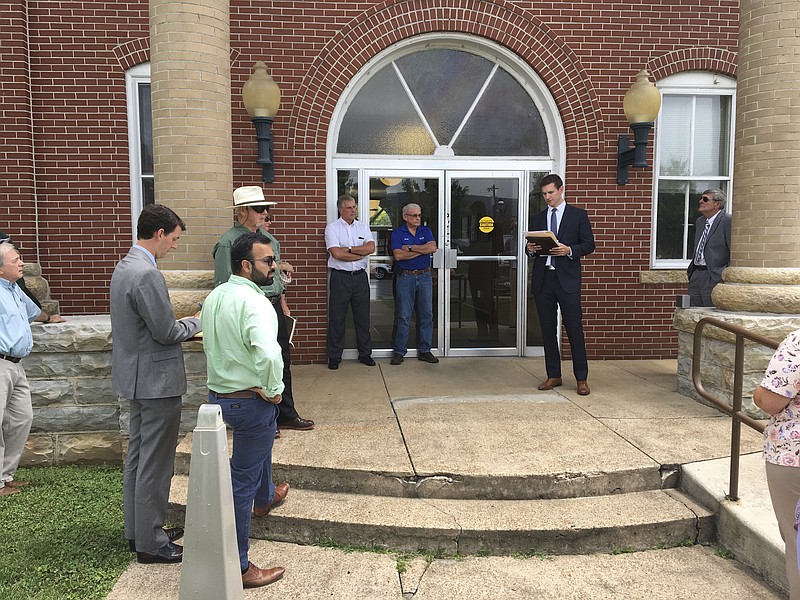Two brothers who promised to bring 1,000 jobs to economically distressed Bledsoe County have admitted they illegally diverted more than $3 million of state and TVA assistance to their personal accounts or other unauthorized uses, including a fraudulent scheme to sell tarps to the federal government for hurricane relief in Puerto Rico.
Rahim and Karim Sadruddin, the CEO and chief operating officer respectively of the Textile Corp. of America in Pikeville, have entered a plea agreement after prosecutors accused the businessmen of three criminal counts of fraud and money laundering stemming from their failed business venture.
The Sadruddins had promised to ultimately invest $27 million of their own money to match more than $3.2 million of assistance from the Tennessee Department of Economic and Community Development and the Tennessee Valley Authority to build a major American sewing mill to make apparel, bedding and linens in an abandoned automotive supplier plant in Pikeville. But prosecutors said the business never produced any product and the former Dura Automotive plant they acquired in 2017 to house the Textile Corp. of America had to be sold in July to pay off creditors who had a lien on the property.
In a 13-page plea agreement, U.S. Assistant Attorney Steven Neff said Rahim Sadruddin falsely claimed in April 2018 that he had invested $17 million of his family's money in the Pikeville plant and that the facility was in commercial operation producing textile products in order to secure state and federal grants. Only a handful of the 1,000 promised jobs ever materialized and some of the money was diverted to buy tarps, which were improperly acquired from China to supply the Federal Emergency Management Agency for hurricane relief.
"In sum, Karim Sadruddin and Rahim Sadruddin conspired to ... intentionally participate in a scheme to defraud by knowingly making various fraudulent representations (emails and other wire-related representations) to FEMA, TVA and the state of Tennessee," Neff said.
Lee Davis, an attorney for Rahim Sadruddin, said Wednesday that his client met with prosecutors "and freely acknowledged and accepted responsibility for his actions and that is why we have entered an information and guilty plea with the government and why he will enter court once a date is set and enter a guilty plea and accept responsibility."
The Sadruddins are also expected to plead guilty to state charges to be filed in Bledsoe County, Davis said.
The Sadruddins, who said they were fourth generation textile industry veterans with ties to major Pakistani textile producers, formed Textile Corp. of America in early 2017 along with Chattanooga businessman and developer Ed Cagle and former Alabama Attorney General Troy King. During an announcement of their venture with former Tennessee Gov. Bill Haslam in July 2017, King said their project would be the biggest new investment ever in Bledsoe County and "represents the renaissance of America, the return of America as a global manufacturing center."
The company received a $3 million grant from the Tennessee Department of Economic and Community Development and $230,000 in incentives from the Tennessee Valley Authority to aid their business after the brothers falsely said they had spent their own money to start the business. Court records show the business had to turn to high-interest lenders to secure money to buy the former Dura Automotive plant on Ferro Road, which shut down in 2005.
"They told a believable story and they fooled a lot of people, including the federal government, the state government, TVA and our local government," Bledsoe County Mayor Gregg Ridley said Wednesday. "They sure fooled me and I was shocked it turned out like it did."
Pikeville Mayor Phil Cagle, who is not related to Ed Cagle, said he is "deeply disappointed" the proposed project never got off the ground and the city never received any property taxes during the three years the company was trying to get started.
"The city owned this building [formerly owned by Dura Automotive] but we freely signed it over to the county Industrial Development Board because we wanted the jobs," Cagle said. "We were that desperate and needed these jobs and that is the real tragedy of all this that people who had hopes of getting a job in this mill have been let down."
Ed Cagle said he is among those who were fooled by the Sadruddins, although a civil lawsuit against Ed Cagle by the Sadruddins claim the co-owner took money from the business and promoted the use of outside lenders.
"I never made a dime on this business," Cagle said earlier this year, noting that he alerted federal officials of suspected problems last year.
Under the plea agreement reached with federal authorities, the Sadruddins have agreed to give up their ownership and control of bank accounts and properties in Tennessee and Georgia and also agree to work to recover what funds are available to repay the debts of Textile Corp. of America.
Contact Dave Flessner at dflessner@timesfreepress.com or at 757-6340.
